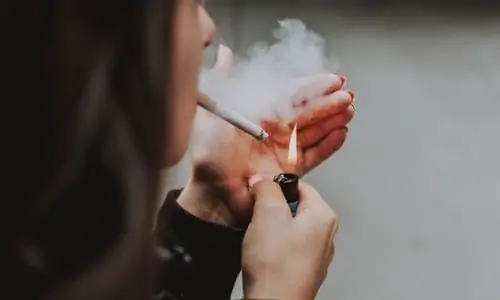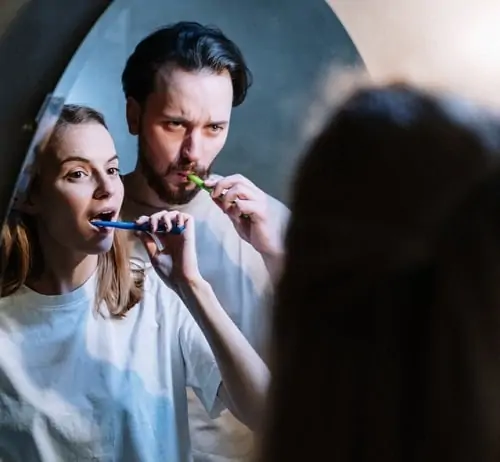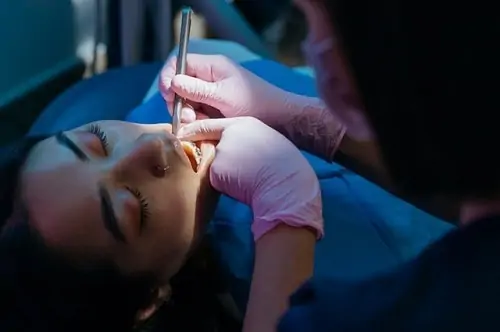Blog
Do Teeth Get Better After Quitting Smoking?

According to the American Dental Association, quitting smoking has been shown to improve oral health in several important ways. Perhaps most importantly, your teeth and gums may become healthier. If you’re trying to kick the habit, join your dentist in Douglasville as we share some ways quitting can help improve your overall health and oral health.
Why Is Smoking Bad For Oral Health?
Most people know that smoking is bad for overall health, but did you know that it can be detrimental to oral health, too? Smokers have an increased risk of developing some serious oral health issues, such as:
- Gum disease
- Dry mouth
- Tooth discoloration
- Bad breath
- Tooth loss
- Oral cancer
Can You Reverse The Effects Of Smoking?
If you’re a smoker, you may feel that there is no point in quitting, especially if you’ve been smoking for a long time. However, your dentist in Douglasville has good news. Once you stop smoking, the risk of developing gum disease or oral cancer drops to non-smoker levels. This may take some time, but it’s well worth the health benefits. Additionally, the American Cancer Society showcases additional benefits to quitting smoking at any age such as lowering the risk of cancer and extending your life by 10 years.
How to Stop Smoking
Quitting smoking can be very difficult as it’s a highly addictive habit. But don’t lose hope. There are a number of ways people have successfully quit. It’s important to note that not every tip will work for everyone. Keep an open mind and keep trying alternatives.
- Pick a Quit Date
Some smokers may try to stop smoking “cold turkey,” meaning that one day they just stop. While this can work for some people, it’s incredibly difficult. Instead, professionals recommend picking a quit date and working your way to that quit date by decreasing the number of cigarettes you have a day.
- Find a Support System
Quitting on your own can make the process even harder, so try getting a support system. This can be a family member, friend, or perhaps even a coworker. Talk to them about how they can best help you and in ways that you will find most supportive.
- Supplement with Something Healthy
A lot of smokers have trouble quitting because of the simple act of holding something in between their figures or puffing on something throughout the day. If you find this to be the case, try to find a healthy alternative. For example, snack on vegetables, chew sugarless gums, hold a pencil in between your fingers, or consider a nicotine replacement product.
It’s incredibly important that everyone visits their dentist in Douglasville at least twice a year, but this is even more important for smokers. Regular visits help keep teeth and gums healthy and are a great opportunity to check for any signs of oral cancer or other problems. Usually, when a dental problem is caught early, treatment is more successful and easier.
Do Cavities Spread Like The Common Cold?

As we head into the cooler months, it’s normal to think about reducing the likelihood of you or your family getting the common cold, the flu, or of course, COVID-19. But should you also be concerned with catching a cavity? Are cavities contagious like a cold? Thankfully, your dentist in Douglasville has some answers.
Good & Bad Bacteria
All of us have a variety of different types of bacteria in our mouths. Some of these bacteria are good and can help keep mouths healthy. But there are also some bad bacteria, particularly Streptococcus mutans and porphyromonas gingivalis, that can lead to decay and cavities. So what does this have to do with cavities being contagious? We’re glad you asked.
Sharing Sometimes Isn’t Caring
Even though we all have bacteria in our mouths, we don’t necessarily all have the same types of bacteria. So when you come in contact with a new strain of bacteria, it can cause problems, and it’s most likely there to stay. What’s more, if you swap bacteria with someone and the person happens to have those bad bacteria, and you don’t, they can make their way into your mouth and create cavities. Some of the top ways you can transfer bacteria between people are:
- Sharing utensils
- Sharing a straw
- Biting off the same piece of food
- Kissing
- Using someone else’s toothbrush
The Concern With Kids
Kids are at increased risk for developing cavities through shared saliva. Kids don’t have as many types of bacteria in their mouths and their immune systems tend to be weaker than adults’, meaning that any new bacteria that enters their system can make them more likely to get a cavity or two. In fact, the transmission of bad bacteria is most common between parents and kids.
Protect Yourself, Protect Others
Unfortunately, there’s no way for you to know if you’re transmitting bad bacteria to someone else or if they may be transmitting them to you. However, you can do your part to reduce the risk.
- Brush and floss your teeth regularly
- Don’t share forks, spoons, straws, or toothbrushes
- Drink plenty of water to keep your mouth hydrated
- See your dentist in Douglasville at least twice a year
Regular dental checkups can not only help protect your teeth from developing cavities, but they can also help catch any other problems early. If it’s longer than six months since your last dental visit or dental cleaning, schedule an appointment with your dentist in Douglasville today.
What’s it Mean When Your Dental Benefits Expire?

Dental insurance can be an amazing tool, but that doesn’t mean you should wait until the last minute to use it. If you don’t get in to see your dentist in Douglasville before your benefits expire, you could miss out on potentially life-changing treatment. While each policy will be different, it’s worth checking your specific insurance to see whether your benefits expire at the end of the year. If so, schedule an appointment with your dentist before December!
Maximums
One of the most important parts of dental insurance is making sure you know your yearly maximums. A maximum is the total amount of dental benefits insurance plans offer each year. Typically, these range from about $1,000 to $1,500 a year. As always with insurance, there are probably some limitations as to what services you can use that money for. But either way, if you don’t use the maximum amount allowed to you as part of your plan, you will lose it when your benefits expire.
Deductibles
Another aspect of many dental insurances is a deductible. If your plan has a deductible, it means you must pay for a certain dollar amount of treatment before your insurance kicks in. Some patients end up paying their deductible and never take advantage of the dental benefits. Essentially, this is money lost.
Covered Treatments
One of the more confusing parts about dental insurance is what treatments are covered and how much of each treatment is covered by insurance. Sometimes insurance covers preventive care at 100% and portions of some additional services such as cosmetic dentistry. This is where your dentist in Douglasville can help you maximize your insurance benefits for the care you need and want
Prevention is Best
You’ve probably heard that prevention is the best medicine. We agree, especially when it comes to dental care. The best way to maximize your dental benefits is to see your dentist regularly and at least every six months for preventive care. Many dental problems can sneak up on us and may not even have any symptoms until the problem is serious (and sometimes costly). However, preventive dental appointments can help catch potential problems early when treatment is often easier — on your and your wallet.
We understand that dental insurance can be confusing. After all, they’re all different. But they do all have one thing in common — the benefits expire. Don’t let your hard-earned dental benefits go to waste. Call to schedule an appointment with your dentist in Douglasville today.
5 Tips to Help You Recover from Wisdom Teeth Removal

Wisdom teeth are the last teeth to erupt in your mouth. But unfortunately, many times these teeth need to be removed. Your dentist in Douglasville may recommend wisdom teeth extractions if there’s not enough room in your mouth for them to erupt without damaging other teeth or if they’re coming in crooked or sideways. While it’s natural to feel a bit uneasy about any surgery, wisdom teeth removal is usually a fairly straightforward procedure. However, there are some restrictions to what you can do post-surgery so that you can heal quickly and properly. Follow these five tips to help you fully recover, without causing further damage or pain.
- Take It Easy
Depending on the type of anesthesia used, you may feel a bit groggy after your procedure, so it’s crucial that you take it easy for a few days. During this time, avoid activities like bending over, lifting heavy objects, or doing strenuous activities. These can increase blood flow and cause the surgical site to bleed more and swell up. Avoid exercise for about 3-4 days or until your Douglasville dentist gives you permission.
- Keep Ice On The Area
Swelling after having your wisdom teeth removed is normal, but we encourage you to do your best to keep it under control by using ice packs. Gently apply ice packs to the sides of your cheeks as much as possible during the first three days. A good rule of thumbs is to keep the ice on for 20 minutes, keep it off for 20 minutes, then repeat. Don’t apply ice directly to your skin, always make sure there’s some sort of barrier in place. An important note: swelling may increase a few days after surgery then subside.
- Control Bleeding
Bleeding after having a tooth extracted is normal, but there are things you can do to help reduce it. To control bleeding at home, your dentist in Douglasville will recommend that you gently bite down on gauze in the areas of extraction. This pressure can help stop the bleeding. Make sure to wash your hands before handling putting the gauze in and taking it out so that bacteria isn’t introduced into your mouth.
- Eat Soft Foods
Following wisdom teeth surgery, you may be tempted to go back to eating normally. However, you should eat a soft food diet for a few days. This means forgoing crunchy veggies, crackers, nuts, and anything else that might put pressure on your gums or cheek muscles. Instead, snack on things like:
- Soup
- Yogurt
- Applesauce
- Scrambled Eggs
- Oatmeal
Also, avoid eating or drinking anything that’s really hot, super spicy, or acidic.
- Drink Plenty of Water
One of the most important things to remember during recovery is to stay hydrated. This means increasing your daily intake of water. Water will help flush out your mouth and keep your throat moisturized after surgery. To help reduce swelling, you can also gargle gently with warm saltwater. However, remember to avoid using straws. The sucking action can loosen blood clots that are an essential part of healing.
Remember, your dentist will only recommend wisdom teeth surgery if it’s necessary to keep your mouth healthy. While you may have some minor pain and discomfort after the procedure, it should be temporary, and you should be healed in no time. However, if the pain doesn’t go away or the bleeding doesn’t stop, call your dentist in Douglasville for more information.
5 Ways to Tell If You Have Gum Disease

Gum disease, also known as periodontal disease, can cause the gums to become inflamed and infected. This condition can be both painful and embarrassing, but many people don’t realize they have it until the symptoms are severe. To make matters worse, gum disease that has progressed can’t be cured, only treated. One of the best ways to catch gum disease early is to pay attention to the top five signs of gum disease, and if you do experience symptoms, see your dentist in Douglasville quickly.
- Bleeding Gums
When you floss or brush your teeth, do you often see blood on your toothbrush? Believe it or not, bleeding while you brush or floss can actually be an early sign of gum disease. If left untreated, bacteria can spread through your gums to affect the bone structure in your jaw. A good rule of thumb: if you see blood, bring it up with your dentist in Douglasville right away. Early treatment can help get things under control before it’s too late.
- Swollen Gums
Gingivitis is a common form of gum disease that most often manifests as swollen, red gums. This is most often an indication that plaque has accumulated on your teeth and has begun to calcify. Your dentist may be able to treat you with a deep cleaning or antibiotic treatment if they suspect you have gingivitis. However, if you ignore your symptoms for too long, it could lead to periodontitis, which can lead to tooth loss and infection in other parts of your body.
- Painful Gums
It’s possible to have gum disease and never experience any pain, but severe cases of gum disease typically cause soreness. If you notice that your gums are sensitive or painful to touch after flossing or brushing, you might be suffering from plaque buildup. However, it’s important to note that if you can explain the cause of the pain, such as a piece of food lodged in your gums, there may be no cause for concern.
- Sensitive Gums
If your teeth are sensitive to hot or cold foods, it could simply be a sign of sensitive teeth. However, it can also be a sign of gum disease. When gum disease happens, it causes gums to become inflamed. This can cause teeth to protrude outwards, leading to sensitivity to heat or cold. Make sure to talk with your dentist in Douglasville about any tooth or gum sensitivity you have at every visit.
- Bad Breath
Bad breath that lasts for longer than two weeks can be a sign of gum disease. If you don’t floss and brush your teeth well daily, food bits can remain in your mouth. These foods will feed mouth bacteria and cause bad breath and a buildup of plaque. This plaque can irritate your gums and allow gum disease to take hold. Usually, bad breath is one of a few signs of gum disease.
Gum disease is a serious condition that can have long-term health consequences. If you have any of these symptoms, don’t wait to see a dentist in Douglasville. Early detection and treatment are essential for preventing more serious problems later on.
How to Get Whiter Teeth in 4 Easy Steps

Over time, your teeth can develop stains and discoloration that diminish their shine and luster. Luckily, you don’t have to live with less than a dazzling smile. In fact, you can whiten your teeth and restore their natural beauty in just four easy steps! Let your dentist in Douglasville teach you how.
- Brush & Floss
Brushing your teeth is not only good for your oral health but also good for preventing staining. Ideally, you should brush your teeth after every meal; however, twice a day is a good place to start. In addition to brushing after every meal and snack, try getting into habits like rinsing and spitting after you eat — it’ll help clear food from between your teeth and prevent bacteria from being left behind that could lead to staining. But you can’t forget about the floss. Flossing is just as important as brushing when it comes to both maintaining a healthy mouth and a white smile. Flossing helps remove plaque from between teeth, preventing discoloration.
- Avoid Tobacco
When you smoke or chew tobacco (or anything else containing nicotine), it stains your teeth and gums. Pair the nicotine with tar and you have a double whammy. Even small amounts of tar build up over time, making your teeth appear yellowed and stained. Avoiding tobacco can help keep your teeth stain-free and bright and white.
- Smile Whitening Treatments
There are two main types of smile whitening treatments — over-the-counter products and professional in-office whitening. There are pros and cons to each.
- Whitening strips are affordable, easy to use, and available at nearly every drugstore. However, it often takes longer to see results and the results can be short-lived. Additionally, the whitening gel can easily come in contact with the gums and cause irritation.
- Professional teeth whitening requires an appointment but is done by a dental professional who can ensure each and every tooth is getting treated and that your gums aren’t exposed to the whitening ingredients.
The downside of either whitening treatment? They may leave your teeth feeling a bit sensitive for a few days following treatment. Determining the right option for you requires a chat with your dentist in Douglasville.
- Cosmetic Dentistry
When tooth stains are more than surface stains, they can be very difficult to impossible to remove through brushing and traditional whitening treatments alone. Luckily, there are cosmetic dentistry options, such as veneers, that can help. Veneers can take years off your appearance by covering unsightly stains and imperfections like gaps or spaces between teeth. They’re custom-created to be the perfect size, shape, and color for an enhanced, yet natural, appearance.
If you’re looking for a professional way to get whiter teeth, start with the basics. If you’re not seeing the results you want, cosmetic dental solutions are available that can make a difference in just one or two office visits. For more information about how you can get whiter teeth, schedule an appointment with your dentist in Douglasville today!
How to Freshen Your Breath for National Fresh Breath Day

National Fresh Breath Day is celebrated on August 6th this year, and if you’re feeling like your breath could use some freshening, you’re not alone. In fact, wondering how to freshen breath is one of the most common questions your dentist in Douglasville is asked. So whether you’re preparing for an important business meeting or getting ready for a date, having fresh breath will leave you feeling confident and ready to take on the day ahead of you. Follow these tips to have your breath smelling great in no time at all!
Brush & Floss
You’ve heard us say it before and you’ll hear us say it again — brushing and flossing your teeth daily is the best way to keep dental problems at bay, including bad breath. Make sure you’re brushing your teeth at least every morning and before bed every night. If you can, try to brush after meals, too. When it comes to flossing, we recommend flossing at least once a day with traditional floss or a water flosser. Also, don’t forget to clean your tongue! Tons of bacteria linger on the bumpy surface, so it’s important to gently brush your tongue every time you brush your teeth.
Avoid Dry Mouth
Dry mouth is one of the leading causes of bad breath, so to combat bad breath you need to first combat dry mouth. Dry mouth can be caused by numerous things such as alcohol, soft drinks, tobacco, and certain medications. Of course, we never recommend stopping any medications without first speaking to your physician. We do recommend drinking plenty of water throughout the day to help keep your mouth hydrated.
Eat Your Vegetables
Eating a well-balanced diet packed with fresh vegetables isn’t just good for your body, it’s also good for your teeth and gums. Crunchy veggies help gently scrub away bacteria and can even help hydrate your mouth. Also, green leafy vegetables such as chard, kale, collard, mustard, spinach, and alfalfa are loaded with chlorophyll, which happens to be a natural deodorizer.
See Your Dental Hygienist
We all know that your dentist in Douglasville recommends visiting at least twice a year, or more often for those who have a history of gum disease or other oral health problems. But did you know that checkups and cleanings with your hygienist can also help keep your breath fresh? Getting professional cleanings regularly will help remove both bacteria and sticky plaque that’s impossible to remove at home — both of which can contribute to bad breath.
If you really want fresh breath on National Fresh Breath Day — and every day of your life — see your dentist in Douglasville today. Dentists are experts at diagnosing underlying problems like gum disease and tooth decay, so they can give you targeted solutions for keeping your mouth healthy and fresh-smelling.
4 Oral Health Dangers of Vaping

In recent years, vaping or e-cigarettes have become increasingly popular, particularly among young adults and even teens. They’re often seen as a ‘healthier’ version of smoking cigarettes. But as more studies come out, we’re finding out more and more ways vaping can be detrimental to overall health. The concerns don’t end there. There are also oral health side effects of vaping that your dentist in Douglasville wants you to be aware of.
Vaping and Oral Health
Vaping bypasses traditional means of smoking by eliminating the tobacco and substituting it for flavored or unflavored liquid. But that doesn’t mean they’re without dangerous ingredients that harm both oral and overall health.
1. Propylene Glycol
Propylene glycol is one of the most common ingredients in vaping liquid, and it’s also one of the things that concerns your dentist in Douglasville. This liquid, when broken down in the mouth, creates various byproducts that are all toxic to tooth enamel and the soft tissues in the mouth. Essentially, it can wear down enamel, weaken teeth, and leave them at risk for decay. That’s not all. Propylene glycol also dries out the mouth and limits saliva production. When this happens, some side effects may include dry mouth, bad breath, and an increased risk for gum disease and cavities.
2. Vegetable Glycerin
Another dangerous liquid found in e-cigarettes is vegetable glycerin, which gives e-liquid a sweet flavor. Vegetable glycerin is found in some foods we eat and acts as a sweetener there too. One thing about this product that pleases your dentist in Douglasville is that it’s not believed to cause cavities. But, when vegetable glycerin is mixed with flavoring, which many e-liquids do, the results are a bit scary. According to one study, flavored e-liquids contributed to a 27% decrease in enamel hardness. That, paired with the fact that the thickness of the liquid in the mouth makes more bad bacteria stick to teeth and teeth crevices, can result in decay.
3. Nicotine
Just as with traditional cigarettes, e-cigarettes are addictive thanks to the nicotine content. Nicotine itself brings a whole host of oral health concerns, one being the effect it has on gum tissue. Studies show nicotine can restrict blood flow to the gums and affect immune cell functions, all of which can put someone in danger of developing gum disease.
4. Batteries
Even though e-cigarettes don’t require a flame to use, they can still be dangerous. The lithium batteries that power vape pens have a tendency to overheat, and there have been reports of pens exploding. These explosions can cause serious injuries to the mouth and face, and while rare, can even result in fatal damage.
Many people use vaping as a way to stop smoking traditional tobacco products as it’s often seen as a better alternative. However, vaping doesn’t come with its risks. Besides the oral health side effects listed, vaping has been linked to:
- Pneumonia
- Rapid heart rate
- Congestive heart failure
- Stroke
It’s never too late to quit smoking traditional cigarettes or e-cigarettes. The American Lung Association has some great advice and is a good place to start.
Why It’s Important To Brush Your Teeth At Night

After a long day, you may consider skipping your nightly brushing routine and heading straight to bed instead. However, brushing your teeth every morning and every night is crucial to maintaining good oral health and protecting your teeth against decay, cavities, and other oral health problems. No matter how tired you may be, trust your dentist in Douglasville and take two minutes to clean your pearly whites.
The Problem With Acid
Our mouths naturally produce acid constantly throughout the day and night. But thankfully, we have a built-in defense against acid — saliva. Saliva neutralizes these acids and rinses them away before they have a chance to wear down the protective layer of tooth enamel. Saliva production is more active during the day and is working overtime to destroy acid. But at night, saliva production slows down and can’t protect teeth against acid as well. However, brushing your teeth at night with fluoride toothpaste can create a layer of protection against these acids.
Food Debris
Ideally, we eat at least three meals a day, and sometimes we snack in between meals. That means there are a lot of chances for food debris to get left behind at the end of the day. If they’re left alone, bacteria will feed on the food, which increases the chance of decay. Brushing your teeth at night can help remove food particles, stave off bacteria, and protect your teeth as you sleep.
Protection Against Plaque
Plaque is the yellowish sticky stuff that adheres to the teeth. Regularly brushing and flossing can remove plaque and limit its ability to build up over time. When plaque isn’t removed, it can lead to tooth decay, cavities, and even gum disease. In fact, plaque build up is often the main cause of dental problems. Removing it each night can keep you from needing to see your dentist in Douglasville for treatment.
Morning or Night: Which is More Important?
Even though your dentist in Douglasville will always recommend that you brush your teeth twice a day, once in the morning and once a night, if you absolutely need to choose between the two, brushing at night is actually slightly more beneficial. Sticking to a regular brushing habit at bedtime removes food, acid, and bacteria that have built up throughout the day, protecting your teeth from cavities.
Before you lay your head down on your pillow to sleep, make sure you take some time to brush your teeth properly. Choose a soft-bristled toothbrush, angle it at 45-degrees, and gently scrub each section of your mouth in tiny circular motions. It’s also important that you floss in between each and every tooth to remove any plaque, bacteria, or food debris that may be hiding.
Besides brushing your teeth every night (and ideally every morning!), make sure you maintain regular appointments with your dentist in Douglasville. These checkups can remove any plaque that may have hardened into tartar and protect your teeth from oral health problems.
What Does It Feel Like When A Filling Falls Out?

More than 91% of the American adult population has had at least one cavity, and the most common treatment for a cavity is a super-strong dental restoration called a filling. However, no matter how tough a filling is, it can still come loose and fall out. But how do you know if you lost a filling and need to see a dentist in Douglasville?
Pain & Sensitivity
While numerous things can contribute to tooth pain and sensitivity, one of the most common explanations for this type of discomfort is a lost filling. Hot or cold foods and drinks that cause zings of pain through your tooth could indicate that the protection of a filling is no longer there. If you’re ever experiencing tooth pain or hot-cold sensitivity, it usually means something isn’t right and that you should see your dentist as soon as possible.
Feeling a Hole
Sometimes fillings fall out and you don’t even know it. This usually happens while eating, and you may not experience any pain but your tongue feels a sharp hole or indentation in your tooth. This is a key indicator that your filling is no longer there and that you need a replacement.
Biting a Hard Crunch
As we’ve mentioned, losing a filling while eating is pretty common. If a filling falls out while you’re chewing you can actually bite down on it and feel a hard crunch. Now, tiny crunches happen while eating all sorts of food, so don’t panic. See if you can feel around for any holes. If you do, call your dentist in Douglasville.
Food Gets Stuck
Food particles will always get stuck in between teeth and in the tiny crevices. But if you’re noticing a large amount of food buildup in an area that had a filling, you may have lost a filling without knowing it.
Reduce Your Risk
Dental fillings are constructed of tough materials, but they aren’t invincible. They can weaken over time naturally or because of a bad bite, clenching, or grinding. However, many fillings fail due to the foods we eat. Chewy, sticky foods as well as hard, crunchy snacks such as popcorn and pretzels are some of the most common causes of loose or lost fillings. To reduce your risk of losing a filling, enjoy these types of foods in moderation, take good care of your teeth by brushing and flossing regularly, and wear your night guard if you’re prone to clenching or grinding while you sleep.
If you think one of your fillings fell out, it’s crucial to schedule an appointment with your dentist in Douglasville as soon as possible. Early treatment can help save your tooth and prevent other problems from occurring.
